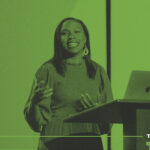Bible literacy is a popular topic in women’s ministry today. And there really couldn’t be a better topic. Women are hungry for the Word, but they can also be unsure of how to approach it. Many feel intimidated.
The good news is you don’t have to be a Bible teacher or have a seminary degree to know and enjoy God’s Word deeply.
I corresponded with Jen Wilkin, author of Women of the Word (Crossway, 2014) and None Like Him (Crossway, 2016), about why the subject of Bible literacy is so relevant, what tools she uses, and more.
How did the topic of Bible literacy become so important to you?
My childhood was marked by time spent in seven different denominations—a range of experience that left me with the conviction that knowing the Word was the only sure means of discerning truth from error. As I entered college, I began to notice that women were rarely asked to actually study Scripture. We were given devotional materials and topical studies, but we were rarely asked to think hard about how our beliefs were informed by the Bible. Most of us formed our beliefs based on what someone said about the Bible, rather than taking it on its own terms. As I began gaining and employing good study habits, Scripture began yielding rich treasure in a way it hadn’t before. Most importantly, I began to realize that it was a revelation of the nature and character of God from start to finish. Who wouldn’t want to spend time digging into that?
Why is this topic so important in the church today?
I’ve spent 20 years either participating in, facilitating, or leading women’s Bible studies. Experience has taught me all of us need help in the area of study. Many women spend their entire lives in church (even in organized studies), yet they are never taught even the most basic study methods. We exist on a teaching diet that’s almost exclusively topical, yielding us a spot knowledge of Scripture at best. Bible illiteracy is rampant in our churches. Few of us possess foundational knowledge of our sacred text; even fewer know how to develop it.
With the culture at large shifting rapidly, the necessity of knowing our Bibles will become increasingly apparent. We must be a people who know why we believe what we believe, grounded in a firsthand knowledge of God’s Word. I plan to equip as many women as I can, and pray others will exert themselves to do the same.
Like Paul learning to be content, I imagine you didn’t become a Christian and then automatically know how to read your Bible. How did you learn to read and study it?
I had excellent teachers, both men and women, who challenged me to have a thinking faith and an orderly approach to my study. I’ve also learned through sitting under bad teachers, as well as through my own trial and error. I have an English degree, which has proven a huge asset to studying and teaching the Bible. In fact, much of our Bible literacy problem is the result of a general literacy problem. We don’t just lack understanding of how to read the Bible; we lack understanding of how to read books in general. My background in literature gave me a desire to treat the Bible as just that—a book.

This may seem obvious, but often we treat the Bible like a magical object through which the Spirit speaks to us according to some mysterious process. The Spirit does speak to us through the Bible, and his ways can be mysterious. But while the Bible is more than just a book, it is not less. It deserves to be accorded at least the same level of respect we’d give to the works of Shakespeare or even the Encyclopedia Britannica. No serious student of Shakespeare would read his works the way many of us read Scripture. We don’t get to approach the Bible or any other book according to our whim. Books yield their treasures to those who search earnestly for the meaning the author has placed there. That requires observing a process, one most of us learned at some point in English class.
What tools do you use for researching and studying God’s Word?
I use the method I ask others to use. I start by researching the historical and cultural context for a particular book of the Bible. Then I begin reading the book repetitively from start to finish, marking a copy of the text with major themes, repeated phrases or ideas, questions, attributes of God, and cross-references. I read multiple translations. I summarize and paraphrase. Once I’ve worked to get the text “under my skin,” I start consulting reliable commentaries to help guide interpretation and application. I like to work from general to specific, from the most accessible to the most academic. This is the process that forms the basis for every study I write and every lesson I teach.
What encouragement would you give to these three groups:
(1) The new Christian who is hungry to learn about God but has rarely or never read his Word?
Start! But don’t start just anywhere, and don’t start alone. Reach out to a mature believer to help you begin the process of forming good study habits. Choose a short book of the Bible like James and read it repetitively. Try to write what you’re reading in your own words. Discuss the insights you’re seeing with your study partner. Or join an organized study that meets regularly to learn the Bible line by line. And be patient—every good endeavor begins with awkwardness and difficulty, but gets easier over time.
(2) Christians who have been reading God’s Word all their life but discover they’ve been misinterpreting much of it?
Rejoice that God is faithful to point you toward a truer means of interpretation! Isn’t he good to do so? And know that your years of wandering in the interpretive desert are not lost—he redeems them. You will be such an avid student, knowing the dangers of misinterpretation and treasuring your newfound appreciation for honoring the context and handling the text with care.
(3) Christians who are extremely intimidated by reading God’s Word because they have every intention to “get it right” but simply aren’t sure.
God’s Word is a gracious gift to you. None of us “gets it right” all of the time, but we honor the Lord in our efforts. You are allowed to make mistakes, to form an opinion on a text and then change it as your understanding grows. All learning involves risk and discomfort. We can trust God to be faithful to his promise that we will find profit from our time searching the Scriptures. He has given us faithful teachers and co-learners to help us, as well. And he promises to give wisdom to any who ask (James 1:5). The God who commands us to love him with our minds also provides us with everything needed to do so. That is good news to encourage the fainthearted student!
Editors’ note: You can read more from Jen in her book None Like Him (Crossway, 2016) [20 quotes | excerpt | review], or use one of her study guides to start studying the Bible on your own. Sign up to hear Jen teach on “Why It's Good that God Is Different from Us” at The Gospel Coalition 2017 National Conference, April 3 to 5 in Indianapolis.
Involved in Women’s Ministry? Add This to Your Discipleship Tool Kit.
 We need one another. Yet we don’t always know how to develop deep relationships to help us grow in the Christian life. Younger believers benefit from the guidance and wisdom of more mature saints as their faith deepens. But too often, potential mentors lack clarity and training on how to engage in discipling those they can influence.
We need one another. Yet we don’t always know how to develop deep relationships to help us grow in the Christian life. Younger believers benefit from the guidance and wisdom of more mature saints as their faith deepens. But too often, potential mentors lack clarity and training on how to engage in discipling those they can influence.
Whether you’re longing to find a spiritual mentor or hoping to serve as a guide for someone else, we have a FREE resource to encourage and equip you. In Growing Together: Taking Mentoring Beyond Small Talk and Prayer Requests, Melissa Kruger, TGC’s vice president of discipleship programming, offers encouraging lessons to guide conversations that promote spiritual growth in both the mentee and mentor.

































